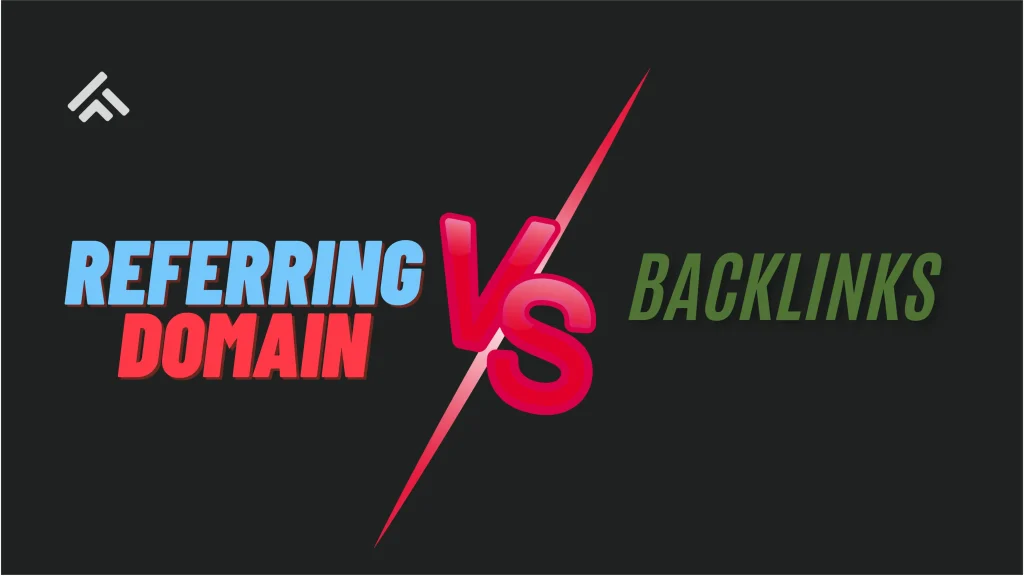If you know what “backlinks” or “referring domains” mean, you can use them the right way. This helps your website show up higher in search results. When you understand these terms, you can also talk better with people who help you with SEO.
Knowing SEO words saves time and avoids confusion. You don’t need to guess what things mean. You can plan your content and marketing better. It also helps you check reports and tools more easily. In short, learning basic SEO terms helps you grow your website faster.
Table of Contents
What Are Referring Domains
Referring domains are the unique websites that link to your website. Each different website that sends a link to your site counts as one referring domain. For example, if five different websites link to your page, you have five referring domains.
These referring domains are important because search engines like Google use them to measure your website’s trustworthiness. When many different websites link to your content, it shows that your site is valuable and reliable. This helps improve your website’s reputation in the eyes of search engines.
Having links from a variety of sources is usually better than having many links from the same website. Links from many different domains show diversity, which search engines prefer. It means your content is popular across the web, not just on a few sites.
What Are Backlinks
Backlinks are links from other websites that point to your website. They act like votes of confidence, showing search engines that your site has valuable and trustworthy content. When a website links to you, it signals that your page is useful or important, which helps search engines understand your site better.
There are different types of backlinks. Some are called DoFollow links, which pass SEO value or “link juice” to your site, helping improve your rankings. Others are NoFollow links, which don’t pass SEO value but can still bring visitors and increase your site’s exposure. Both types play a role in building your website’s online presence. While the number is important, quality backlinks matter more than sheer volume.
Backlinks help improve your website’s ranking in search results by showing search engines that your content is popular and trusted. The more quality backlinks you have from reputable sites, the higher your site can appear. However, it’s not just about the number of backlinks but also their quality and relevance to your topic.
Differences Between Referring Domains and Backlinks
Backlinks
Backlinks are links from one website to another. They show a direct connection between web pages. You can have many backlinks coming from the same website if it links to your site multiple times. These links act like votes that tell search engines your content is valuable. Backlinks help improve your website’s ranking because they show popularity and trust from other sites. However, having lots of backlinks from just one site is less powerful than getting links from many different sites.
Backlinks also vary in quality. A backlink from a popular, trusted website carries more weight than one from a low-quality or spammy site. The context of the backlink matters too—links placed naturally within relevant content are more valuable. That’s why building good backlinks requires careful effort to get links from reputable and relevant sources.
Referring Domains
Referring domains count the number of unique websites linking to your site. Even if one website links to you many times, it still counts as only one referring domain. Search engines pay close attention to referring domains because links from many different sites show wider trust and authority. Having a high number of referring domains is often more important than having many backlinks from just a few sites. This diversity helps improve your website’s credibility and ranking more effectively.
A strong referring domain profile means your site is recognized across the web. It signals to search engines that your content appeals to a broad audience and isn’t reliant on just a handful of sources. Growing the number of referring domains takes time and good outreach, but it is one of the best ways to build long-term SEO strength.
Why Referring Domains Matter in SEO
Referring domains matter in SEO because they show how many different websites trust your content. When many unique websites link to your site, it tells search engines that your content is useful and reliable. This builds your website’s authority and can help you move up in search rankings.
Search engines value variety. If you get a lot of links from just one site, it doesn’t carry as much weight. But if you get one link each from 50 different websites, it looks much better. It means people across the internet are noticing your content, not just one source.
Having more referring domains also lowers the risk of spam penalties. Search engines can see when links come from only a few places, and it may look unnatural. A healthy mix of domains makes your link profile stronger and more natural.
The Role of Backlinks in Search Rankings
Backlinks play a major role in how well your website ranks on search engines. When other websites link to your content, it shows search engines that your site has useful and trusted information. These links act like votes, telling Google or Bing that your content is worth showing to more people.
The quality of backlinks matters just as much as the number. Links from well-known, high-authority websites carry more weight than links from low-quality sites. If a trusted website links to your page, it gives your site more credibility. This can help push your pages higher in search results.
Backlinks also help search engines discover your content faster. When a search engine crawls a website and finds a link to your site, it may follow that link to index your content. So backlinks not only boost trust, but also help with visibility and faster indexing.
Analyze Referring Domains and Backlinks
To understand your website’s SEO strength, you need to look at both referring domains and backlinks. These two metrics tell you how other websites interact with your content. Referring domains show how many unique websites link to you, while backlinks count the total number of links. A high number of backlinks with very few referring domains may suggest unnatural or spammy linking.
Referring domains give you a clear picture of trust from across the web. If your site has links from many unique and high-quality domains, it means your content is being recognized by different sources. This is a strong signal to search engines that your site is valuable and worth ranking higher.
Backlinks, on the other hand, help you measure content popularity. If many pages are linking to a specific article or post, it shows that people find it useful. However, quantity alone is not enough. A good backlink profile should include links that are relevant, natural, and come from strong domains.
By regularly analyzing both, you can spot gaps, avoid risks like link spam, and plan smarter SEO strategies. Tracking growth in referring domains and maintaining high-quality backlinks is key to building long-term online success.
Conclusion
Referring domains and backlinks are both important for SEO. Referring domains show how many unique websites trust your content. Backlinks show how often your content is linked.
Focus on getting links from many different, trusted websites. Don’t just aim for a high number of backlinks from the same site. A good mix helps boost rankings, build trust, and grow traffic. Keep your link profile natural and strong. This way, your site will perform better in search engines.



